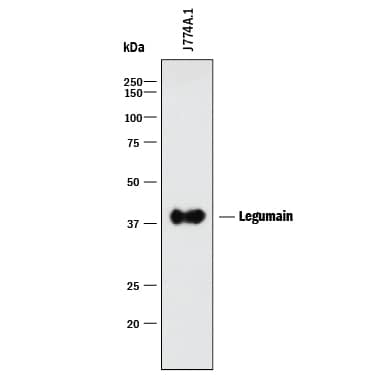Mouse Legumain/Asparaginyl Endopeptidase Antibody
R&D Systems, part of Bio-Techne | Catalog # MAB2058

Key Product Details
Species Reactivity
Validated:
Cited:
Applications
Validated:
Cited:
Label
Antibody Source
Product Specifications
Immunogen
Val18-Tyr435
Accession # O89017
Specificity
Clonality
Host
Isotype
Scientific Data Images for Mouse Legumain/Asparaginyl Endopeptidase Antibody
Detection of Mouse Legumain/Asparaginyl Endopeptidase by Western Blot.
Western blot shows lysates of J774A.1 mouse reticulum cell sarcoma macrophage cell line. PVDF membrane was probed with 2 µg/mL of Rat Anti-Mouse Legumain/Asparaginyl Endopeptidase Monoclonal Antibody (Catalog # MAB2058) followed by HRP-conjugated Anti-Rat IgG Secondary Antibody (Catalog # HAF005). A specific band was detected for Legumain/Asparaginyl Endopeptidase at approximately 37 kDa (as indicated). This experiment was conducted under reducing conditions and using Immunoblot Buffer Group 1.Applications for Mouse Legumain/Asparaginyl Endopeptidase Antibody
Western Blot
Sample: J774A.1 mouse reticulum cell sarcoma macrophage cell line
Reviewed Applications
Read 1 review rated 4 using MAB2058 in the following applications:
Formulation, Preparation, and Storage
Purification
Reconstitution
Formulation
Shipping
Stability & Storage
- 12 months from date of receipt, -20 to -70 °C as supplied.
- 1 month, 2 to 8 °C under sterile conditions after reconstitution.
- 6 months, -20 to -70 °C under sterile conditions after reconstitution.
Background: Legumain/Asparaginyl Endopeptidase
Legumain is a lysosomal cysteine protease found in all mouse tissues examined, but was particularly abundant in kidney and placenta (1). Legumain plays a pivotal role in the endosomal/lysosomal degradation system because the Legumain deficiency causes the accumulation of pro cathepsins B, H and L, another group of lysosomal cysteine proteases (2). Over-expression of Legumain in tumors is significant for invasion/metastasis (3). Also known as asparaginyl endopeptidase, it specifically cleaves peptide bonds with Asn at the P1 position. Nevertheless, it also cleaves peptide bonds with Asp at the P1 position. Auto-activation of pro Legumain involves both types of cleavage, which results in the removal of the pro peptides in both C- and N-termini (4). In addition, Legumain activates pro MMP‑2 and processes bacterial antigens for MHC class II presentation and pro thymosin alpha to thymosin alpha1 and thymosin alpha11, two acidic peptides with immunoregulatory properties (5‑7). Mouse Legumain is synthesized as a 435 amino acid precursor with a signal peptide (residues 1 to 17). The pro enzyme (residues 18 to 435) was expressed with an N-terminal His tag. The purified pro enzyme can be activated under the conditions as described above. Legumain activity can be inhibited by rmCystatin C and recombinant human cystatins C and E/M (R&D Systems, Catalog # 1238-PI, 1196-PI, and 1286-PI).
References
- Chen, J.M. et al. (1998) Biochem. J. 335:111.
- Shirahama-Noda, K. et al. (2003) J. Biol. Chem. 278:33194.
- Liu, C. et al. (2003) Cancer Res. 63: 2957.
- Li D.N. et al. (2003) J. Biol. Chem. 278:38980.
- Chen, J.M. et al. (2001) Biol. Chem. 382:777.
- Schwarz, G. et al. (2002) Biol. Chem. 383:1813.
- Sarndeses, C.S. et al. (2003) J. Biol. Chem. 278:13286.
Alternate Names
Gene Symbol
UniProt
Additional Legumain/Asparaginyl Endopeptidase Products
Product Documents for Mouse Legumain/Asparaginyl Endopeptidase Antibody
Product Specific Notices for Mouse Legumain/Asparaginyl Endopeptidase Antibody
For research use only
